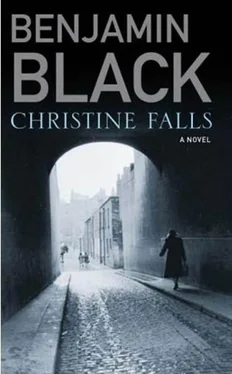When she walked into reception at the Holy Family, carrying her gloves, the smell hit her at once and it was so strong she thought for a moment she would have to turn around and walk out again. But she forced herself forward to the desk and the dragon lady there-why would anyone choose to wear spectacles with pale pink, translucent frames?-and asked if Dr. Quirke might be available. “ Mr. Quirke, is it?” the dragon snapped. Sarah knew of course it should be Mr., and serve her right for her patronizing assumption that she would not be understood if she did not ask for him as Dr. She would never master the rules, never.
She sat on a hard bench by the wall and waited. Quirke had told the dragon to say he would come up right away. She watched the usual procession of the halt and the maimed, the accident cases, the bandaged children, the shock-faced old, the mothers-to-be struggling along in the wake of their enormous stomachs, being bullied already by the unborn. She wondered how Mal could face these women, day after day, year after year. Quirke’s clients at least were conveniently dead. She chided herself: her thoughts were all of an unrelieved bleakness in these days.
Quirke was loosely gowned in green. He apologized for the delay; one of his assistants was off sick, the place was in chaos. She said it was not important, that she could come back another time, yet wondered silently how there could be such urgency to his work-the dead would stay dead, surely? No, he was saying, no, she must stay, now that she was here. She could see him wondering why she was here; Quirke had always been a calculator.
They sat at a plastic-topped table beside a dusty window in the hospital canteen. Down at the serving end there was a counter with rumbling tea urns and glass cases containing triangular sandwiches curled at the tips, and miniature packets of biscuits, and what were called, with what she thought of as stark aptness, rock cakes. Why was it, she wondered idly, when Quirke had gone off to fetch their tea, that hospitals here were so run-down and dingy and uniformly miserable? The window beside the table where she sat looked out on a blockhouse built of bricks the color of old blood, the flat roof of which, apparently made of asphalt, sported at one corner a crooked stovepipe chimney with a cowl, from which smoke was pouring sideways, flattened by the strong October wind. Without her wanting it to, her mind speculated on what in a hospital could require burning that would produce a smoke so dense and black. Quirke returned, bearing mugs of presugared, milky tea, which she knew she would not be able to bring herself to drink. She felt it coming on, that increasingly familiar sense of weakness, of lightness, as if she were somehow floating up out of herself, as if her mind were detaching itself and floating free of her. Was this what they meant in the old books when they spoke of the vapors ? She wondered how worried she should be about her health. But would not death, she thought, be a solution to so many things? Though she did not really imagine she would escape that easily, or that soon.
“So,” Quirke said, “I suppose this is about Mal?”
She looked at him searchingly. How much did he know? She wanted to ask, she dearly wanted to ask, but she could not bring herself to speak the words. What if he knew more than she did, what if he was privy to things even more terrible than she had learned of? She tried to concentrate, grasping at her scattering thoughts. What had he asked her? Yes: if it was about Mal that she had come. She decided to ignore this. She said:
“Phoebe wants to marry that young man.” She touched the handle of the mug with her fingertips; it felt slightly sticky. “It’s impossible, of course.”
Quirke frowned, and she could see him readjusting his thoughts, his strategies: Phoebe, then, not Mal. “Impossible?” he said.
She nodded. “And needless to say, there’s no talking to her.”
“Tell her to go ahead and do it,” he said. “Tell her you’re all for it. Nothing more likely to put her off the idea.”
She thought it best to disregard this also. “Would you speak to her?”
He leaned back in the chair and lifted high his head and looked at her along one shallow side of his flattened nose, nodding slowly, grimly. “I see,” he said. “You want to persuade me to persuade Phoebe to give up her inconvenient boyfriend.”
“She’s so young, Quirke.”
“So were we.”
“She has all her life before her.”
“So had we.”
“Yes,” she said, pouncing, “and look what mistakes we made!” The fierceness was gone as quickly as it had come. “Besides, it wouldn’t work. They’d make sure of that.”
Quirke raised an eyebrow. “They? You mean Mal? Would he really want to destroy her happiness?”
She was shaking her head before he had finished speaking, her eyes cast down. “You don’t understand, Quirke. There’s a whole world. You can’t win with a whole world against you, I know that.”
Quirke looked out the window. Clouds the color of watered ink were roiling on the far horizon; it would rain. He was silent a moment, studying her with narrowed eyes. She looked away. “What is it, Sarah?” he said.
“What?” She tried to be offhand and airy. “What’s what?”
He would not let go; she felt like the quarry borne down on by a single, relentless, huge hound.
“Something’s happened,” he said. “Are you and Mal-?”
“I don’t want to talk about Mal,” she said, so fast it might have been not a sentence but a single word. She put her hands on the table before her, beside her gloves, and looked at them. “Then there’s my father,” she said. He waited. She was still frowning at her hands, as if they had suddenly become an object of fascination. “He’s threatened to cut her out of his will.”
Quirke wanted to laugh. Old Crawford’s will, no less-what next? Then he had a sudden, unnervingly clear image of horse-faced Wilkins, his assistant, waiting for him in the lab-Sinclair was having one of his strategic bouts of flu-and shivered at this glimpse of the world of the dead, his world.
“What about the Judge?” he said. “Why not get him to talk to Phoebe, or to Mal-to your father, maybe, too? Surely he’d knock sense into them all and make them solve it?” She gave him a pitying look. He said, “There will have to be a solution, one way or the other, in the end. I say it again: tell her she can marry him, urge her on. I bet she’ll give Bertie Wooster the old heave-ho.”
Sarah would not smile. “I don’t want Phoebe to be tied down in an early marriage,” she said.
He laughed incredulously. “An early marriage? What’s this? I thought it was because Carrington is a Prod?”
She was shaking her head again, her eyes on the table. “Everything is changing,” she said. “It will be different in the future.”
“Oh, yes, in a hundred years’ time life will be beautiful.”
She shook her head stubbornly. “It will be different, in the future,” she said again. “Girls of Phoebe’s generation, they’ll have a chance to escape, to be themselves, to”-she laughed, embarrassed by what she was about to say-“to live!” She lifted her eyes to his and shrugged one shoulder, abashed. “I wish you’d speak to her, Quirke.”
He sat forward so abruptly her gloves on the table seemed to shrink back from him, clasping each other. How lifelike they looked, Sarah thought, a pair of black leather gloves. As if some otherwise invisible third person at the table were wringing her hands.
“Listen,” he said impatiently, “I have no time for that chinless wonder Phoebe has set her heart on, but if she’s determined to marry him, then good luck to her.” She made to protest but he held out a hand to silence her. “However, if you were to ask me to speak to her, for you-not for Mal, or your father, or anyone else, but for you-then I would.”
Читать дальше












